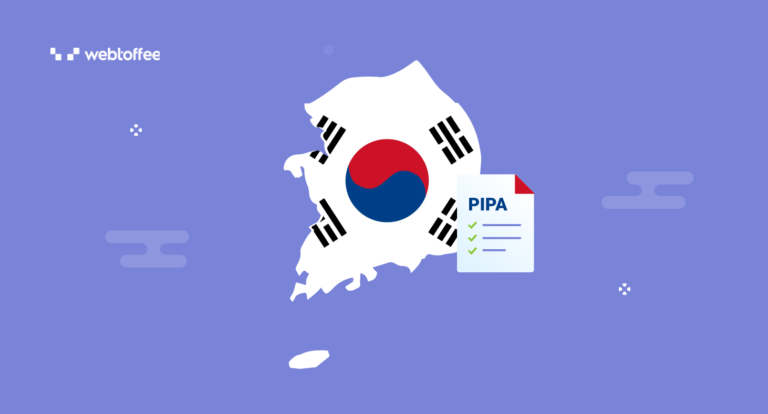South Korea’s Personal Information Protection Act is a comprehensive data protection regulation that protects the personal data of South Korean residents. In this article, we will be giving an overview of the act and its obligations.
South Korea’s Personal Information Protection Act came into effect on September 30, 2011. The law was aimed at protecting the privacy rights of South Korean residents and regulating the processing of their personal data.
If you are doing business with South Korean residents or want to know more about PIPA and how it affects business, this article is for you. We will cover everything you need to know about South Korea’s personal data protection regulation, its principles, the rights of the data subjects, etc.
So let’s get started.
The Personal Information Protection Act (PIPA) is South Korea’s principal data protection law that protects the privacy rights of South Korean residents. The law was introduced in 2011 and was amended twice, in 2021 and in 2023, respectively.
The Personal Information Protection Act requires specific obligations for organizations handling personal data of South Koreans. It requires websites to give prior notification to users and obtain consent before collecting their personal data.
With the new amendments, data subjects will have the right to data portability and the right to be excluded from automated decision-making. It also regulates the cross-border transfer of personal data of South Korean residents.
Also Read: China’s Personal Information Protection Law (PIPL)
- Personal information: Personal information refers to any information related to an individual that can be used to directly identify an individual, combined with additional information to identify an individual or any pseudonymized information that requires additional data to make it identifiable.
- Pseudonymization: Pseudonymization refers to the process of making personal information unidentifiable without additional information by deleting or replacing the part of the information.
- Processing: Processing refers to the collection, generation, connecting, interlocking, recording, storage, retention, value-added processing, editing, searching, output, correction, recovery, use, provision, disclosure, and destruction of personal information and other similar activities.
- Data subject: Data subject refers to any individual who can be identified through the processed information and is the subject of that information.
- Personal information file: Personal information file refers to a set of personal information organized in a systematic manner.
- Personal information controller: Personal information controller refers to any individual or organization that processes personal information directly or indirectly and organizes personal information as personal information files.
- Public institution: Public institution refers to national institutions such as administrative bodies of the National Assembly, Courts, Constitutional Court, National Election Commission, and other administrative and national agencies prescribed by Presidential Decree.
- Visual data processing devices: Visual data processing devices are those devices that are prescribed by the Presidential Decree and are placed in certain public places to take images and videos.
- Scientific research: Scientific research refers to research that uses scientific methods, like technological development, fundamental research, applied research, and privately funded investigations.
Below are the 8 major principles for processing personal information under PIPA for personal information controllers:
- Clearly state the purpose for collecting data, and only collect the minimum data required for that purpose in a lawful and fair manner.
- Process the personal information in an appropriate manner and only for the purpose it was intended for.
- Ensure that personal information is accurate, complete, and up to date.
- Safely manage the processing of personal information and take appropriate steps to protect the data from potential risks.
- Disclose the privacy policy and related information on processing personal information to the public and ensure the rights of data subjects are respected and protected.
- Reduce the risk of privacy infringement when processing personal information.
- Prioritize anonymization or pseudonymization to protect the identities of the data subjects.
- Obtain trust with data subjects by fulfilling obligations outlined in the Act.
South Korea’s PIPA grants the following rights to data subjects for protecting their personal information:
- Right to be informed: Data subjects have the right to be informed of the processing of their personal information.
- Right to consent: Data subjects have the right to decide whether or not to consent to the processing of personal information and decide the extent of the consent.
- Right to confirm processing, access, and obtain copies: Data subjects have the right to confirm the processing of their personal data and access and obtain copies of their data.
- Right to suspend processing, correct, delete, or destroy information: Data subjects have the right to suspend or terminate the processing of their personal information and correct, delete, or destroy the processed information.
- Right to fair redressal: Data subjects have the right to fair redressal of any potential damages that arise from the processing of their personal information.
Here are the obligations of the state and the local governments under PIPA:
- Develop policies to prevent misuse of personal information and protect individual privacy.
- Implement measures to safeguard the rights of the data subjects.
- Promote self-regulating data protection efforts by personal information controllers.
- Ensure that statutes and municipal ordinances are enacted or amended in order to align with the Act’s objectives.
The Personal Information Protection Commission is the regulatory authority for the Personal Information Protection Act. The Commission consists of nine Commissioners, including a Chairperson and a Vice Chairperson.
The Chairperson and Vice Chairperson are proposed by the Prime Minister, and the other Commissioners are recommended by various bodies based on their experience and expertise in personal information protection.
Below are the duties and responsibilities that fall under the jurisdiction of the Personal Information Protection Commission:
- Improve laws on personal information protection.
- Develop and implement policies, systems, or plans for protecting personal information.
- Investigate infringements on the rights of data subjects and enforce appropriate measures.
- Address complaints, facilitate remedies, and mediate disputes related to the processing of personal information.
- Collaborate with international organizations and foreign agencies on personal information protection.
- Conduct research, education, and awareness campaigns on laws, policies, and systems for personal information protection.
- Support developments in personal information protection and train experts.
- Handle matters specified in this Act and other relevant statutes falling under the Commission’s jurisdiction.
Circumstances for Collecting Personal Information
An organization can collect and use personal information if:
- they get consent from the data subjects.
- there’s a legal obligation.
- it’s necessary for a government agency to perform its duties
- it’s needed to fulfill a contract with the person the information is about.
- it’s urgently needed to protect someone’s life, body, or property, and they can’t give permission themselves.
- it’s necessary for the controller’s legitimate interests, but only if it’s closely related to those interests and doesn’t harm the person’s rights to an extent.
Additionally, the personal information controller must inform data subjects about what data is collected, why it’s collected, and how long it will be kept. They should also inform them of their right to deny consent and the consequences of doing so.
Also Read: Generative AI and Privacy Concerns: All You Need to Know
To comply with South Korea’s Personal Information Protection Act (PIPA), follow these instructions:
- Understand the scope and requirements of the act.
- Appoint a person or a team to oversee data protection compliance within your organization.
- Inform individuals about how their personal information is being handled. This includes providing clear and easily accessible privacy notices that explain the purposes of data processing, the rights of individuals, and how they can exercise those rights.
- Obtain explicit consent from individuals before collecting, using, or sharing their personal information.
- Collect only the personal information that is necessary for the purposes stated and retain it only for as long as necessary.
- Implement appropriate technical and organizational measures to protect personal information from unauthorized access, disclosure, modification, or deletion.
- Ensure the accuracy of the personal data of the individuals. Also, allows users to request the correction of their data.
- Provide users with the option to ask the copies of their personal data stored with the organization.
- If transferring personal information outside of South Korea, ensure that adequate safeguards are in place to protect the data.
- Regularly review and update your data protection policies and procedures to ensure ongoing compliance with the PIPA.
- Conduct internal audits and impact assessments to identify and address any potential compliance gaps or security vulnerabilities.
- Establish an active response mechanism for addressing data breaches. This includes notifying affected individuals and relevant authorities in accordance with the requirements of the PIPA.
Also Read: Singapore’s Personal Data Protection Act (PDPA) – An Overview
The Personal Information Protection Act has different penalty provisions for different non-compliance and violations.
Below are the details of the penalties and the offense included:
1. Imprisonment with labor for up to 10 years or a fine of up to 100 million won
- Altering or erasing personal information to disrupt a public institution’s operations.
- Unlawfully collecting personal information and profiting from processing personal information by third parties.
2. Imprisonment with labor for up to 5 years or a fine of up to 50 million won
- Collecting or sharing personal information without consent.
- Misuse of personal information for profit or unfair purposes.
- Unlawful processing of sensitive personal information.
- Misuse of pseudonymized personal information.
- Mishandling personal information by information and communication service providers.
- Collecting personal information of children under 14 years of age without his or her legal representative’s consent
- Damaging or altering the personal information of individuals
3. Imprisonment with labor for up to 3 years or a fine of up to 30 million won
- Misusing visual data processing devices.
- Unlawfully obtaining personal information for profit.
- Misusing confidential information acquired during duty.
4. Imprisonment with labor for up to 2 years or a fine of up to 20 million won
- Failing to ensure the safety of personal information, leading to loss or damage.
- Failing to destroy personal information as required.
- Failing to rectify or erase personal information and continuing to use or share it.
Conclusion
South Korea’s Personal Information Protection Act is the country’s principal data protection regulation. The law grants several rights to South Korean residents to protect their personal information.
It also outlines certain principles for businesses that handle the personal information of their customers. The Personal Information Protection Commission would be responsible for regulating the PIPA in South Korea. The law has different provisions for penalties for non-compliance with the act.
We hope this article has helped you understand South Korea’s Personal Information Protection Act. If you have any queries, drop them in the comments section; we’d be happy to help you.
Disclaimer: This article was written based on a translated version of the South Korean Personal Information Protection Act. It was intended for informational purposes only and does not represent legal advice. We have no intention of obtaining any kind of attorney-client relationship. If you are looking for legal advice, we recommend you contact a professional.



